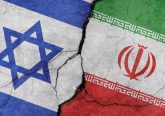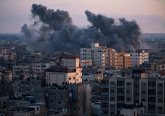 It now seems fairly clear that the US and the UK are set to take military action in Syria in the coming days in response to the recent chemical attacks there. The UK Prime Minister, UK Foreign Secretary and the UK Secretary of State for Defence have all asserted that any action taken in Syria will be lawful. But on what grounds will military action in Syria be lawful. As is well known, United Nations Charter prohibits the use of force in Art. 2(4), as does customary international law. The UN Charter provides 2 clear exceptions to the prohibition of the use of force: self defence and authorization by the UN Security Council. It is almost certain that there will be no Security Council authorization. In a previous post, I considered the possibility of a (collective) self defence justification for the use of force in response to a use of chemical weapons. The scenario contemplated then is very different from the situation that has emerged, and the language used, at least by the UK, does not hint at a use of force on the basis of national interest. However, President Obama in a CNN interview last week did seem to speak of self defence when he said “there is no doubt that when you start seeing chemical weapons used on a large scale … that starts getting to some core national interests that the United States has, both in terms of us making sure that weapons of mass destruction are not proliferating, as well as needing to protect our allies, our bases in the region.” A justification for force on this basis would sound like preemptive self defence in a way that is very close to the Bush doctrine. I find it hard to see the Obama administration articulating a legal doctrine of preemptive self defence claim in this scenario.
It now seems fairly clear that the US and the UK are set to take military action in Syria in the coming days in response to the recent chemical attacks there. The UK Prime Minister, UK Foreign Secretary and the UK Secretary of State for Defence have all asserted that any action taken in Syria will be lawful. But on what grounds will military action in Syria be lawful. As is well known, United Nations Charter prohibits the use of force in Art. 2(4), as does customary international law. The UN Charter provides 2 clear exceptions to the prohibition of the use of force: self defence and authorization by the UN Security Council. It is almost certain that there will be no Security Council authorization. In a previous post, I considered the possibility of a (collective) self defence justification for the use of force in response to a use of chemical weapons. The scenario contemplated then is very different from the situation that has emerged, and the language used, at least by the UK, does not hint at a use of force on the basis of national interest. However, President Obama in a CNN interview last week did seem to speak of self defence when he said “there is no doubt that when you start seeing chemical weapons used on a large scale … that starts getting to some core national interests that the United States has, both in terms of us making sure that weapons of mass destruction are not proliferating, as well as needing to protect our allies, our bases in the region.” A justification for force on this basis would sound like preemptive self defence in a way that is very close to the Bush doctrine. I find it hard to see the Obama administration articulating a legal doctrine of preemptive self defence claim in this scenario.
So, absent Security Council authorization and a self defence claim, would the use of force be lawful? This is a question receiving a lot of media attention in the UK and I spent much of yesterday fielding this question in various media interviews (here on Channel 4, on BBC Radio 5 live [around the 1hr 10 min mark] and here on the Syria Deeply website.) In an earlier post I considered the legality of arming rebels in Syria and concluded that there was no strong legal basis for doing so. Well, the same is true of direct military action. It is hard to make the case that international law allows the use of force in this scenario or that the use of chemical weapons makes the case for lawful military action easier.
Is humanitarian intervention lawful?
The main argument for the legality of the use of force in Syria would be humanitarian intervention. This is the argument that says that States may use force abroad to prevent a humanitarian catastrophe or to stop widespread human rights abuses. It seems to me quite clear that this not an accurate reflection of international law as it currently stands. Let me simply quote what I wrote earlier.
The main problem with this argument is that there is very little State support for the view that international law permits States to use force in other States on humanitarian grounds. The UK is of course one of the few States that does accept that international law provides a right of humanitarian intervention. However, this view has been rejected by the vast majority of States. See for example the 2000 Declaration of the South Summit by the G77 composed of about 130 member States [‘We reject the so-called “right” of humanitarian intervention, which has no legal basis in the United Nations Charter or in the general principles of international law’. para. 54 ]. Also, even other European States have failed to advocate such a right. In the ICJ proceedings regarding the Legality of the Use of Force (by NATO in Yugoslavia), only the UK and Belgium expressly relied on the doctrine of humanitarian intervention. Other NATO countries refrained from doing so.
In short, there is little opinio juris on which a doctrine of customary international law might be based. Although the matter has not been expressly considered by the ICJ, the Court did seem to reject the doctrine of humanitarian intervention in the Nicaragua case (1986). In the case, the Court stated that: “while the United States might form its own appraisal of the situation as to respect for human rights in Nicaragua, the use of force could not be the appropriate method to monitor or ensure such respect.” (para. 268). The argument that international law today allows for unilateral right of humanitarian intervention is very weak. No such right exists in international law as it currently stands.
The responsibility to protect doctrine does not change this position in any way. The 2005 World Summit Outcome document, agreed by consensus at Head of State level in the UN General Assembly, is the definitive document on what the “R2P” doctrine is intended to mean. Para. 139 of the document speaks of collective action, through the Security Council, should peaceful means fail. In other words, forceful action to prevent mass atrocity crimes is reserved to the Security Council. The notion that where the Security Council is deadlocked, “R2P” provides a legal framework for the international community to use military force – either by way of a regional coalition or a so-called “coalition of the willing” is just fanciful. This statement was made by the BBC’s Legal Correspondent in legal analysis that is, sadly, likely to be more widely read than any proper assessment of what international law actually provides. If the making of international law has anything to do with States, this statement is far from the law
In addition to the problem of a lack of a sufficiently general state practice and a lack of opinio jurisamong States, there are also significant theoretical problems with the humanitarian intervention argument. The argument that there is a right of humanitarian intervention is usually put as an argument that a rule of customary international law has developed since the UN Charter. However, this argument requires reconsideration of the structure of the rules relating to the use of force. There are many hurdles that would need to be overcome for this argument to fit into the structure of international law. This argument implies that a rule of customary international law can prevail over or modify the prohibition of the use of force in the UN Charter.
(i) As the Institut de Droit International stated in 1995, “There is no a priori hierarchy between treaty and custom as sources of international law. However, in the application of international law, relevant norms deriving from a treaty prevail between the parties over norms deriving from customary law.” (Conclusion 11, Problems Arising from a Succession of Codification Conventions on a Particular Subject, emphasis added). It is not inconceivable that a customary rule can prevail over a prior treaty but this is rare and is not easy to achieve. One would need to show either desuetude so that the treaty rule is no longer binding. Clearly, Art. 2(4) is still a binding rule.
(ii) The treaty rule that is claimed to be modified is not just any rule in any treaty. It is often claimed that the prohibition of the use of force in Art 2(4) is a rule of jus cogens. Art 53 of the Vienna Convention of the Law of Treaties says that a rule of jus cogens can only be modified by another rule of jus cogens. Clearly a rule permitting humanitarian intervention cannot be a jus cogens rule.
(iii) Art.103 of the UN Charter says that obligations under the Charter prevails over obligations under any other treaty obligation. Sure it does not say the Charter prevails over custom but if States cannot by explicit agreement in a treaty free themselves from their Charter obligations, it seems strange to argue that they can do this by custom.
Each of these arguments may perhaps be overcome and I can’t explore them in full here. However, individually and put together one would need very strong evidence of acceptance of a customary rule that modifies the prohibition of the use of force in Art. 2(4). We are very far from that.
There is another route to a rule permitting humanitarian intervention. This is to say that the prohibition of the use of force in Art. 2(4) and customary international law should be interpreted in a limited way. The argument would be that the prohibition itself is not comprehensive but rather a more limited one that does not extend to uses of force to protect human rights. This would be an argument that seeks to give some effect to the words at the end of Art. 2(4) which prohibits a use of force against the territorial integrity or political independence of another State or in a manner inconsistent with the purposes of the UN. Without going into the details of this argument, the interpretation of the prohibition in Art. 2(4) as a limited prohibition is not the interpretation hitherto given to Art. 2(4). It would require some strained reading of Art. 2(4); is inconsistent with subsequent practice; and also with the drafting history. It is possible for the meaning of the text to change over time but that would require subsequent agreement among the parties, or subsequent practice establishing agreement of the parties to the Charter. Again we are far from that.
If the position is so clear, how can States like the UK continue to claim that international law allows for humanitarian intervention. Are they just misguided? It seems to me that something else is going on here. In a paradoxical way, the UK is acting within the system of international law by making a claim that is contrary to international law. What I mean is that the UK would like to see a particular rule of international law and the only way in which it can see a change in the law is to insist that it’s position is already the law! This is the paradox of customary law. The only way to change it is to break it. So, for the UK to see its vision of international law on humanitarian intervention established, it has to insist that that vision is already established. This is what the opinio juris aspect of custom requires. So the UK is acting within the system of international law by maintaining a view contrary to the law. Of course, the UK hopes that in time others will come to share this view
Should Humanitarian Intervention be Lawful?
This is perhaps the key question that ought to be answered with regard to this topic. However, I don’t aim to tackle it here. All I will point out is that the question of whether international law should allow humanitarian intervention (without Security Council approval) is not the same as whether military intervention for humanitarian purposes should occur. It is possible to take the view that the law should prohibit such action but that there are cases where such action should occur (as a matter of morality) although the prohibition remains in place. Ian Brownlie and Tom Franck made such arguments (though Anthea Roberts has written an essay disagreeing) It may be argued that providing advance legal authorization is more likely to encourage such action whereas what we want is to be very restrictive with regard to permissible uses of force but that in cases of genuine need the international community will excuse and not condemn action. On this view, it would be plausible to take the view that even if action in Syria is unlawful it should nevertheless take place.
(This article was originally posted on 28 August on the European Journal of International Law blog, which can be read here: http://www.ejiltalk.org/humanitarian-intervention-responsibility-to-protect-and-the-legality-of-military-action-in-syria/ )







No Comment